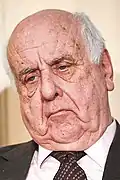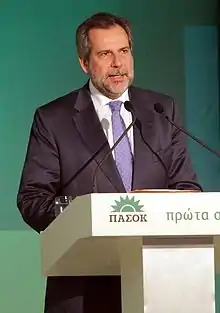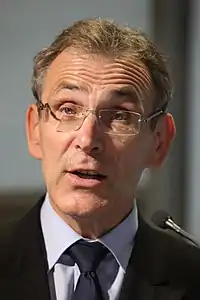European Commissioner for Energy
The European Commissioner for Energy is a member of the European Commission. The current Commissioner is Kadri Simson, in office since 1 December 2019.
| European Commissioner for Energy | |
|---|---|
| Appointer | President of the European Commission |
| Term length | Five years |
| Inaugural holder | Günther Oettinger |
| Formation | 1958 |
| Website | European Commission |
Responsibilities
The Commissioner holds responsibility for the European Union's energy policy as well as nuclear issues (Euratom). It was previously a backwater in the commission but has now become sought-after as the European energy policy has been developed. The Commissioner for Energy has to deal with ongoing gas disputes between Russia and Ukraine which threaten European supplies, reduce dependence on Russian energy and reduce carbon emissions.[1]
The Directorate-General serving this Commissioner is the Directorate-General for Energy, which was combined with Transport prior to 2010.
Miguel Arias Cañete (2014–2019)
A member of the centre-right People's Party, Arias served as Minister for Agriculture, Food and Environment in the Spanish Government from 2011 until 2014, before being selected to head his Party List in the European Parliamentary elections.[2]
Arias Cañete was nominated as EU Commissioner for Energy and Climate Action in the Juncker Commission and took office on 1 November 2014.[3]
Günther Oettinger (2010–2014)
Günther Oettinger was appointed as the new Energy Commissioner in February 2010. However he was criticised for corruption and avoidance of EU law in his home state.[4] His language skills have also been criticised[5] and his nomination was met with confusion in Brussels.[6]
Andris Piebalgs (2004–2010)
During his hearing with the European Parliament, Piebalgs stressed the importance of the environment in energy policy and was cautious of nuclear power. He received strong backing from the Parliament. He outlined his priorities as;[7]
- Achieving a true internal market
- Energy efficiency: everyone can make a difference
- Increase the share of renewable energy
- Increased investments in technology
- Safety and security of nuclear power
- Make it easier for Member States to help each other in energy crisis
- Developing external energy policy relations
The European Union is an active supporter of the Kyoto Protocol, which it signed alongside its member-states. In March 2007 the Union committed itself to cut CO2 emissions by 20 percent by 2020.[8] There is also a desire to reduce dependency on Russian energy supplies following the disputes between Russia and Belarus and Ukraine.[9] In April 2007 five southern European countries signed a deal to build an oil pipeline (the Pan-European Oil Pipeline) from the Black Sea to Italy which will help diversify energy sources.[10]
List of commissioners
| # | Name | Country | Period | Commission | |
|---|---|---|---|---|---|
| 1 | Wilhelm Haferkamp | 1967–1970 | Rey Commission | ||
| 2 | 1970–1972 | Malfatti Commission | |||
| 3 | 1972–1973 | Mansholt Commission | |||
| 4 | Henri François Simonet | 1973–1977 | Ortoli Commission | ||
| 5 |  |
Guido Brunner | 1977–1981 | Jenkins Commission | |
| 6 |  |
Étienne Davignon | 1981–1985 | Thorn Commission | |
| 7 | Nicolas Mosar | 1985–1989 | Delors Commission I | ||
| 8 | António Cardoso e Cunha | 1989–1993 | Delors Commission II | ||
| 9 | .jpg.webp) |
Marcelino Oreja | 1993–1994 | Delors Commission III | |
| 10 | .jpg.webp) |
Abel Matutes | 1994–1995 | Delors Commission III | |
| 11 |  |
Christos Papoutsis | 1995–1999 | Santer Commission | |
| 12 | .jpg.webp) |
Loyola de Palacio | 1999–2004 | Prodi Commission | |
| 13 |  |
Andris Piebalgs | 2004–2010 | Barroso Commission I | |
| 14 |  |
Günther Oettinger | 2010–2014 | Barroso Commission II | |
| 15 | _(cropped).jpg.webp) |
Miguel Arias Cañete | 2014–2019 | Juncker Commission | |
| 16 | .jpg.webp) |
Kadri Simson | 2019–onwards | von der Leyen Commission | |
See also
References
- Who’s who in the new Commission, Financial Times November 2009
- www.elpais.com
- (2 October 2014) Cañete’s hearing spells trouble for Juncker Euractiv Network
- Kurz, Felix (2 February 2010). "Patronage at Home: The Cronyism of Germany's European Commission Candidate Oettinger". Der Spiegel.
- "European commissioner Oettinger – German politician ridiculed YouTube terrible English – News" (in German). Bild.de. 28 January 2010.
- Gathmann, Florian; Schlamp, Hans-Jürgen (27 October 2009). "Günther Who?: EU Perplexed by Germany's Choice of Oettinger as Commissioner". Der Spiegel.
- "The Commissioners – Profiles, Portfolios and Homepages". European Commission.
- "Europe | EU agrees on carbon dioxide cuts". BBC News. 9 March 2007.
- See also: 2004 Russia–Belarus energy dispute, 2007 Russia–Belarus energy dispute and Russia–Ukraine gas disputes.
- "Black Sea oil pipeline to start flowing by 2012". EurActiv. 7 April 2007.